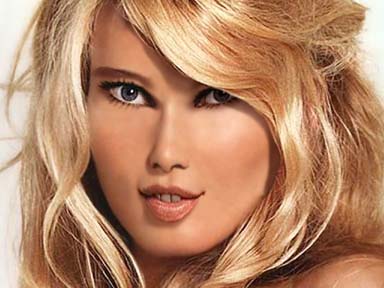| generative
installation
computer, monitor/projector
We know that throughout recorded history people have been concerned
with the topic of beauty, particularly female physical beauty. It can
be assumed that it was already a concern before recorded history. From
the ancient Egyptians through Leonardo da Vinci to Stephen Marquardt‡,
people have tried to quantify beauty and some have even claimed to have
succeeded. However, a mathematical formula that reliably predicts whether
a face is perceived as beautiful or not remains elusive.
Despite the apparent impossibility of quantifying it, much research
has been conducted into our perception of beauty. There seems to be
a general agreement that, accounting for individual tastes and transient
fashions, the perception of beauty remains constant over time and across
all cultures and races. One study‡‡ claims that averageness
is considered most beautiful. Through compositing many photos, an average
face emerged and this was consided by most people to be the most beautiful
- deviations from this average less beautiful.
Beauty is not only of intelectual and aesthetic interest. It is a commercial
matter generating billions of euros every year. On the one hand, there
is the desire to buy beauty in the form of beauty products, beauty therapies
and plastic surgery. On the other hand, this desire is propagated, even
created, through the marketing of beauty. Beauty products themselves
are, of course, sold with a beautiful face. But everything from a chocolate
bar to a television set is sold with the accompaniment of a beautiful
face. That the owners of these beautiful faces receive high monetary
rewards is only the tip of the iceberg. A study‡‡‡
found that people with faces considered to be beautiful earn, on average,
13% more than those who are not so beautiful.
Exactly how we perceive faces is a hotly debated subject. But all researchers
can agree that we have a finely tuned ability to interpret faces involving
a large amount of our mental capacity. The face is, after all, the most
important means of human communication playing a major role survival
and reproduction, as well as in our social skills. When presented with
a new face we make instant judgements about the attractiveness, personality,
mood, intelligence, health, sexuality, age of the person. These judgements
are intertwined with a strong emotional response of attraction or repulsion,
potential threat, potential mate, friend, enemy.
Thus, when confronted with 'A PERFECT FACE', we are forced to re-appraise
the face every few seconds and our emotional reaction changes. The use
of a super-model's face exemplifies beauty in its most superficial form
where beauty is rewarded in isolation of other qualities such as intelligence,
talent and personality. However the face taps into a deeper level of
perception and emotion and we cannot help but interpret the whole range
of human qualities into the person we seen on the screen.
‡ Stephen Marquardt, Californian 'Aesthetic Surgeon', see www.beautyanalysis.com.
The title of this piece is a reference to the web site's opening phrase
- 'What is a Perfect Face'
‡‡ Langlois and Roggmann 1990
‡‡‡ London Guildhall University survey of 11,000 people
|

